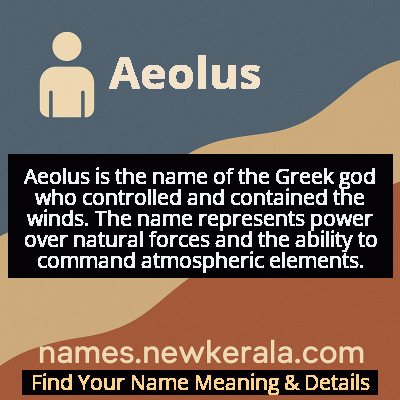Aeolus Name Meaning & Details
Origin, Popularity, Numerology Analysis & Name Meaning of Aeolus
Discover the origin, meaning, and cultural significance of the name AEOLUS. Delve into its historical roots and explore the lasting impact it has had on communities and traditions.
Name
Aeolus
Gender
Male
Origin
Greek
Lucky Number
1
Meaning of the Name - Aeolus
Aeolus is the name of the Greek god who controlled and contained the winds. The name represents power over natural forces and the ability to command atmospheric elements.
Aeolus - Complete Numerology Analysis
Your Numerology Number
Based on Pythagorean Numerology System
Ruling Planet
Sun
Positive Nature
Leaders, ambitious, highly driven, self-reliant, innovative.
Negative Traits
Overly aggressive, domineering, impatient, selfish.
Lucky Colours
Red, orange, gold.
Lucky Days
Sunday.
Lucky Stones
Ruby, garnet.
Harmony Numbers
2, 3, 9.
Best Suited Professions
Entrepreneurs, managers, engineers.
What People Like About You
Courage, determination, leadership.
Famous People Named Aeolus
Aeolus (Mythological)
Divine Ruler
Keeper of the winds who controlled storms and breezes for gods and mortals
Aeolus (Historical Reference)
Mythical Ancestor
Founder of the Aeolian Greek tribe and namesake for Aeolis region in Asia Minor
Aeolus (Literary)
Mythological Character
Featured prominently in Homer's Odyssey as Odysseus' host who gives him the bag of winds
Name Variations & International Equivalents
Click on blue names to explore their detailed meanings. Gray names with will be available soon.
Cultural & Historical Significance
The name also connects to the Aeolian people, one of the four major tribes of ancient Greece, suggesting a cultural lineage that tied meteorological power to ethnic identity and territorial claims in the Aeolis region of Asia Minor. Beyond mythology, Aeolus influenced classical literature, art, and philosophy as a symbol of natural forces that humans must respect but cannot fully control. His legacy persists in scientific terminology, with 'aeolian' describing wind-formed geological features and processes, demonstrating how mythological concepts evolved into scientific understanding.
Extended Personality Analysis
Individuals named Aeolus are often perceived as dynamic, powerful, and changeable, reflecting their namesake's control over the winds. They typically exhibit strong leadership qualities combined with a mercurial nature—capable of great generosity and sudden intensity. Like the winds they represent, Aeolus-named individuals may demonstrate adaptability and versatility, able to navigate different social situations with ease while maintaining an air of authority. Their personality often includes elements of protection and containment, mirroring the mythological Aeolus who kept winds locked away until needed.
This can manifest as careful control over emotions or resources, with occasional explosive releases when boundaries are crossed. The name suggests someone who understands the power of timing and restraint, yet possesses the capacity for dramatic transformation when circumstances demand it. People with this name often display intellectual curiosity and a tendency toward innovation, much like the winds that carry seeds to new territories. They may be seen as agents of change who can clear away stagnation while also possessing the wisdom to know when forceful action is necessary versus when gentle persuasion suffices.
Modern Usage & Popularity
In contemporary times, Aeolus remains an exceptionally rare given name, primarily used by parents with strong interests in classical mythology or seeking unique, powerful names. Its usage is almost exclusively limited to Greek communities or classical scholars, with minimal presence in mainstream naming trends. The name occasionally appears in fantasy literature and gaming communities as a character name, but sees virtually no usage in birth registries of English-speaking countries. Its extreme rarity makes it a distinctive choice for those wanting a name with mythological weight without common usage. Recent trends toward unique and meaningful names have seen a slight increase in consideration, though it remains well outside the top 1000 names in any country. The name's complexity and strong mythological associations make it more suitable for fictional characters than real-world usage in most cultures.
Symbolic & Spiritual Meanings
Aeolus symbolizes the fundamental forces of change, movement, and transformation in human experience. As the master of winds, the name represents both the gentle breezes of inspiration and the destructive power of storms—embodying the spectrum of creative and destructive potential within nature and humanity. Symbolically, Aeolus connects to concepts of freedom and restraint, reflecting how winds can be both liberated and contained. The name also carries associations with travel, journey, and destiny, as winds historically determined the courses of ships and the fates of travelers. In a metaphorical sense, Aeolus represents the unseen forces that shape our lives, the unpredictable elements that can either aid or hinder progress, and the necessity of understanding and respecting natural powers beyond human control. The name embodies the idea that some forces, while invisible, wield tremendous influence over outcomes and require careful management and respect.

